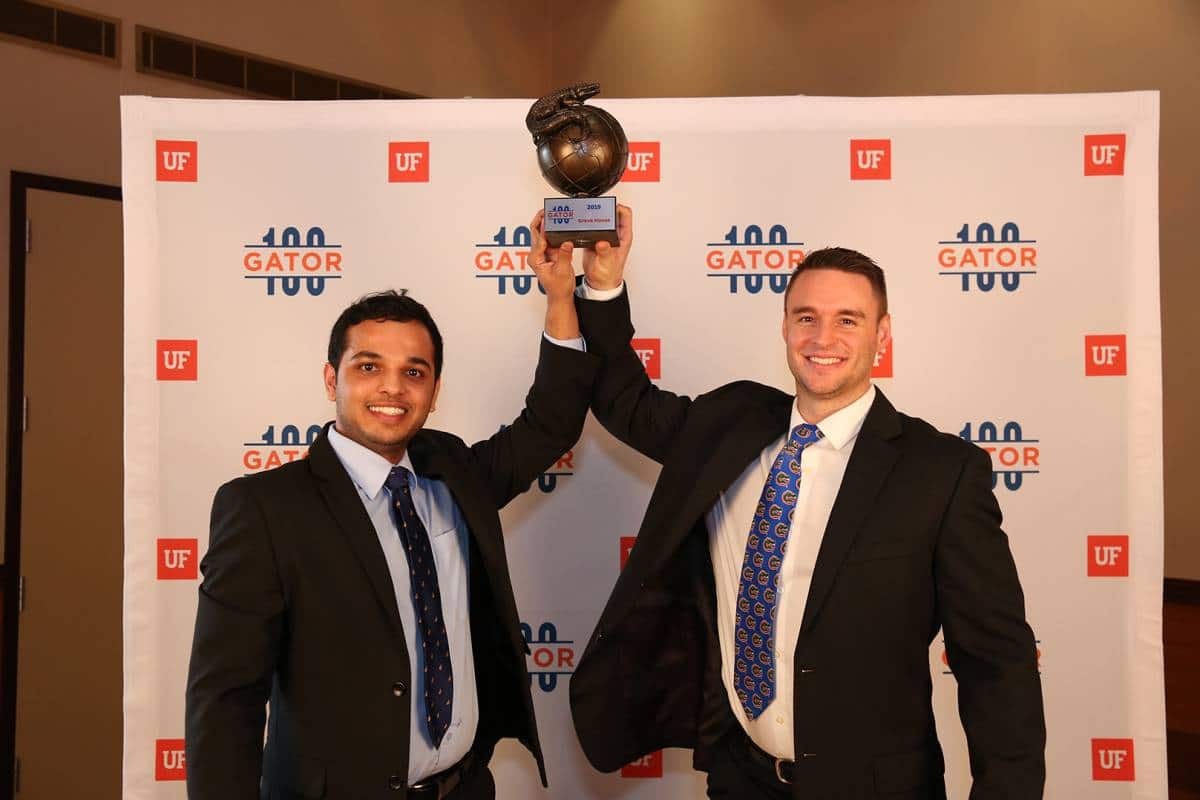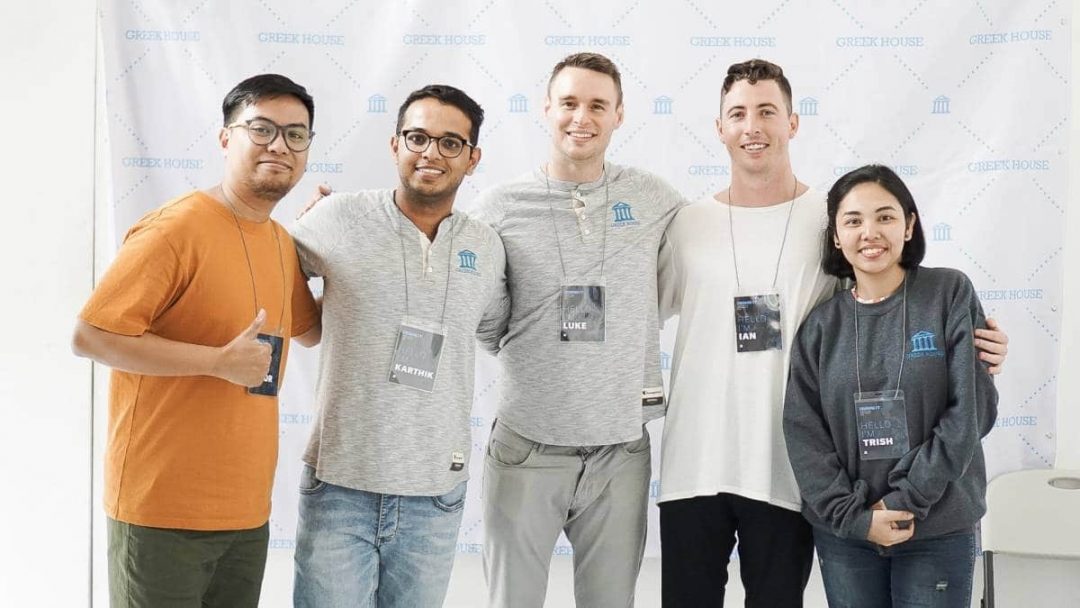From $500 to $5 million – How two UF students turned a side hustle into a multimillion-dollar business
How it started
When Karthik Shanadi (BS ’14), 27, and Luke McGurrin (BSBA ’14), 28, were looking to make apparel for an upcoming fundraiser for their fraternity, they couldn’t find a company that could meet their needs – a short turnaround time, unique design capabilities, all at an affordable price.
“All of the local distributors had a hard time meeting the quick turnaround we needed, and all of the online vendors that we could afford didn’t provide help with the design process,” said Shanadi, Co-Founder & CEO of Greek House. “So, we decided to go directly to a manufacturing facility.”
Upon speaking with a manufacturer, the two quickly realized the opportunity to provide a more convenient and affordable solution for student organizations on the University of Florida campus. McGurrin and Shanadi launched Greek House with $500 in a small 6-by-10 office in their basement in 2013.
An education in entrepreneurship
Shanadi and McGurrin agree that the success they’ve been able to achieve since moving out of that basement is due in part to their education at the University of Florida – McGurrin a graduate of the Warrington College of Business and Shanadi of the College of Agricultural and Life Sciences.
“I can confidently say that attending the University of Florida played a big role in helping us prepare in our journey of entrepreneurship,” Shanadi said. “Going to school with a large, diverse student population emerged us into an environment that was competitive, collaborative and inspiring.”
Everything from classes, like Principles of Entrepreneurship, Marketing, and Financial and Managerial Accounting, to involvement in their fraternity’s executive board to student government helped the pair gain hands-on entrepreneurial experience and a strong network.
“A lot of our first customers came from connections through student organizations we were involved in,” Shanadi said. “Through UF, we were really able to accelerate the growth of our business, utilizing the connections and resources on campus.”
Customers weren’t the only assets from UF that Shanadi and McGurrin tapped into for their business.
“All of our first hires and sales people came from UF,” Shanadi said. “When we moved to Los Angeles, we hired all Gators. Being a part of the Gator Nation is something that we’re very proud of and will always hire Gators first.”
Turning to tech
After gaining customers, the duo quickly learned that in order to better serve their market, they needed to build a platform that customers could use to work with a designer, collect orders and payments from members, and track their orders.
The platform leverages technology to organize a network of designers, suppliers and printers to provide a custom design within 24 hours and orders delivered within 1-2 weeks.
“Design, technology, speed and unique products – these are the core pillars of our business,” said McGurrin. “Our big, hairy, audacious goal is to complete 10 million designs by leveraging our platform to create merchandise for student groups and well beyond.”

Karthik Shanadi (L) and Luke McGurrin hold their Gator100 trophy. Shanadi and McGurrin’s Greek House was the No. 3 company on the 2019 Gator100.
Taking the jump
Both McGurrin and Shanadi are no strangers when it comes to startups and high growth businesses. Shanadi was formerly a Logistics Manager at Amazon (AMZN) and Sales Rep at Salesforce (CRM) while McGurrin had two startups before going full time with Greek House.
The two walked away from a steady paycheck to go full time with Greek House in January of 2016. The business could not afford to pay anyone a salary let alone rent an office. As typical founders, the two forewent their salaries to reinvest in the growth of the business. It was either grow fast, or die.
The next few years were filled with lessons in humility, patience and perseverance. To fund their business over the next two years, the two even took on thousands in credit card debt to help fund the business through the tough times. Though it was hard, they never lost sight of their goal and the persistence paid off.
Since then, they’ve become one of the fastest growing companies with ranking in the top 20 percent of the Inc 5000 with $2.4 Million in revenue for 2018. In a short 3 years, the two founders have grown the business to over 25 employees across 5 countries and serving over 400 campuses nationwide.
They also earned a coveted spot on the 2019 Gator100 list, which honors the 100 fastest-growing Gator-owned or Gator-led businesses in the world. Their first time applying to the Gator100 yielded a No. 3 spot on the list.
“As entrepreneurs, we deal with a lot of failures that lead up to some success and it’s a never-ending cycle,” Shanadi said. “To come back to Gainesville and be recognized as the No. 3 fastest-growing, Gator-led startup after being full time with our business for only three years was an unforgettable experience.”
Shanadi and McGurrin’s Greek House proves that companies don’t have to be in business for a long period of time to achieve success.
“To this day, it’s one of the greatest accomplishments in our company history: we competed with and beat out companies such as Planet Smoothie, Orange Theory Fitness and Study Edge, who have all been around for three to five times longer than we have.”
The duo has already applied for the 2020 Gator100 and are looking to remain a top-ranked company.
“We’re hoping to stay competitive and be a part of the Gator100 for the next 3 years as we’re seeing strong, healthy growth as a company,” Shanadi said.
Looking Ahead
With the recent announcement of the Inc 5000 ranking, the Greek House team has decided to announce the new brand they plan on launching, Threadly.
“Threadly will be a merch platform for businesses, nonprofits and groups,” said Shanadi. “Threadly allows us to branch outside of the college niche. It’s a natural progression because we have existing customers who have come to know and love our brand, but are no longer in college.”
He added, “Our goal with Threadly is to build a more personalized experience using the conversational marketing framework to engage customers, recommend products and designs, and work with a concierge when necessary. We don’t want to be another t-shirt company where you upload your logo, pick a product and checkout. We’ve found customers want a more personalized experience.”
With over hundreds of thousands of products available when consumers are choosing promotional products, it can be overwhelming to find a product or style that is trendy and meets consumers’ budget. Additionally, not many vendors offer custom design or can assist with design at a low cost. Threadly attacks both of these pain points that customers deal with.
“All the time, we have customers who need help with the design aspect. Whether it’s cleaning up a logo or creating a design from scratch, we are able to do it at an affordable cost, fast,” said McGurrin. “Best in class design coupled with high quality and affordable products is our brand promise with Threadly.”
The two stated that they will be at 40 employees by the end of 2020, and are projecting roughly $5 million in sales for 2019. A $500 investment to a $5 million multimillion-dollar business is an impressive feat for anyone. Let alone for founders who are not even 30.




